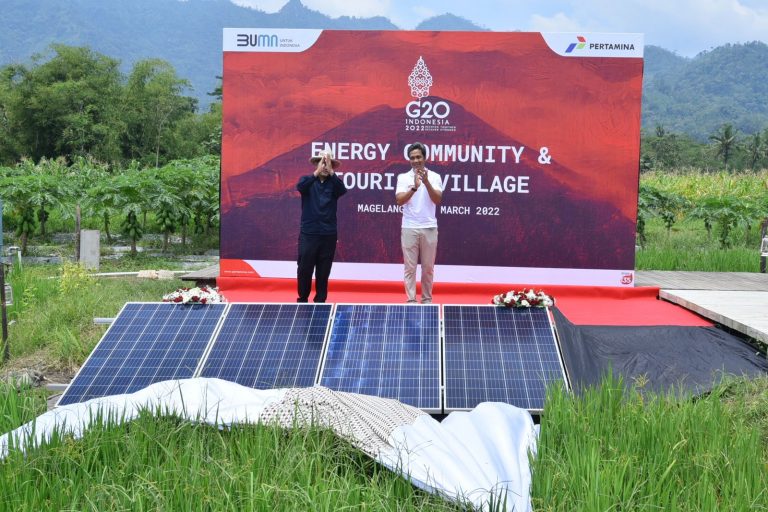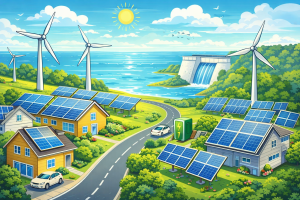
by: Hartatik
Yogyakarta – Pertamina is preparing for energy independence in 38 villages this year through the ‘Desa Berdikari Energi’ program. The Chief Executive Office of Pertamina Subholding Power and New Renewable Energy (NRE), Dannif Danusaputro said that the Desa Berdikari Energi program began in 2021. At that time, 19 villages participated in Pertamina’s program in utilizing new renewable energy (EBT) based on empowerment and local community participation.
“This year, Pertamina is targeting 38 villages. Ten of them are collaborating with the Ministry of Energy and Mineral Resources and young people who are members of the Renewable Energy Society (SRE) through the Solar Electricity Initiative or Guerrilla Program,” said Danusaputro during the inauguration of the PLTS at the Village Economic Center (Balkondes) Karangrejo, Borobudur District, Magelang Regency, Thursday (24/3).
Ten of the energy independent villages are already operating in seven provinces, namely Central Java (Karangrejo Village and Wringinputih Village, Magelang Regency), South Sulawesi (Karang-Karangan Village, Luwu Regency and Cindako Hamlet, Maros Regency), Jambi (Simpang III Sipin, Jambi City), North Sulawesi (Sendangan Village, Minahasa Regency), Aceh (Menasah Keude Village, Aceh Besar Regency), Maluku (Wayame Village, Ambon City) and Bali (Ubud Village, Gianyar Regency).
Danusaputro said, ‘Desa Energi Matahari’ or ‘solar-powered village’, targets villages that have limited access to new and renewable energy (NRE) but have great potential. After receiving support for assistance and CSR funding from Pertamina, these villages will be able to have an impact on progress both economically and in the surrounding environment. He added that realizing energy independence can be started from a small scale, namely rural areas. Such as the use of solar energy through solar power to fulfill electrical energy at Balkondes Karangrejo.
The overall target of Berdikari Energi Village is to be able to reduce gas emissions to 331.67 tons CO2/year, process waste into methane gas by 172,800 m3/year, produce renewable energy with a capacity of 41,517 KWH equivalent to electricity capacity for 1,922 houses (assuming 900 watts / year). In addition to planting 5,000 trees/year, capable of processing 1.4 tons of waste into biodiesel and bioethanol, processing 3,600 kg of used cooking oil into Biofuel (BBN) processing 400 kg of cow dung per day into biogas. If this target can be realized, it will increase the income of the beneficiary village by IDR 938 million/year.
Present at the activity, the Director General of Pollution and Environmental Damage Control (PPKL) of the Ministry of Environment and Forestry (KLHK) Sigit Relianto and delegates from Government Group 20 (G20) countries. Danusaputro said this solar-power generation project was a real action by Pertamina, part of the Task Force Energy, Sustainability & Climate (ESC) Business Group 20 (B20) in order to accelerate the energy transition from fossil energy to NRE.















